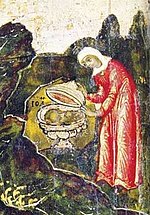
Wiki Details

Joanna (Koine Greek: Ἰωάννα, romanized: Iōanna, also Greek: Ἰωάνα), the wife of Chuza (γυνὴ Χουζᾶ), is a woman mentioned in the gospels who was healed by Jesus and later supported him and his disciples in their travels. She is one of the women recorded in the Gospel of Luke as accompanying Jesus and the twelve apostles and as a witness to Jesus' resurrection. Her husband was Chuza, who managed the household of Herod Antipas, the ruler of Galilee; this is the origin of the distinguishing epithet commonly attached to her name, differentiating her from other figures named Joanna or Joanne.
Her name is from Hebrew: יוֹחָנָה, romanized: Yôḥānāh (transl. 'YHWH has been gracious').
She is recognised as a saint in the Catholic and Eastern Orthodox traditions and among other Christians, such as the Anglicans.
General info from Wikipedia.org

